Ibn Battuta's Travels in the Indian Ocean
Item set
- Title
- Ibn Battuta's Travels in the Indian Ocean
- Description
- This is a set of data points which will be used for my timeline.
- Subject
- Timeline
- Creator
- Tawfiq Alhamedi
Items
-
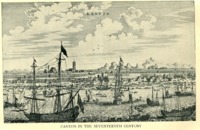 “Sin-Kalan [Canton] is a city of first rank, in regard to size and the quality of its bazaars. One of the largest of these is the porcelain bazaar, from which porcelain is exported to all parts of China, to India, and to Yemen… In one of the quarters of this city is the Muhammadan town, where the Muslims have their cathedral mosque, hospice and bazaar. They have also a qadi and a shaykh, for in every one of the cities of China there must always be a Shaykh al-Islam, to whom all matters concerning the Muslims are referred [i.e. who acts as intermediary between the government and the Muslim community], and a qadi to decide legal cases between them.”
“Sin-Kalan [Canton] is a city of first rank, in regard to size and the quality of its bazaars. One of the largest of these is the porcelain bazaar, from which porcelain is exported to all parts of China, to India, and to Yemen… In one of the quarters of this city is the Muhammadan town, where the Muslims have their cathedral mosque, hospice and bazaar. They have also a qadi and a shaykh, for in every one of the cities of China there must always be a Shaykh al-Islam, to whom all matters concerning the Muslims are referred [i.e. who acts as intermediary between the government and the Muslim community], and a qadi to decide legal cases between them.” -
“Twenty-five days after leaving these people we reached the island of Jawa [Sumatra], from which the incense called jawi takes its name. We saw the island when we were still half a day’s journey from it. It is verdant and fertile; the commonest trees there are the coco-palm, areca, clove, Indian aloe, jack-tree, mango, juman, sweet orange, and camphor cane. The commerce of its inhabitants is carried on with pieces of tin and native Chinese gold, unsmelted…When we reached the harbour its people came out to us in small boats with coconuts, bananas, mangoes, and fish. Their custom is to present these to the merchants, who recompense them, each according to his means. The admiral’s representative also came on board, and after interviewing the merchants who were with us gave us permission to land...I and my companions mounted, and we rode into the sultan’s capital, the town of Sumatra, a large and beautiful city encompassed by a wooden wall with wooden towers. The sultan of Jawa, al-Malik az-Zahir, is a most illustrious and open-handed ruler, and a lover of theologians.”
-
“On the tenth day we reached the city of Kawlam [Quilon], one of the finest towns in the Mulaybar lands. It has fine bazaars, and its merchants are called Sulis. They are immensely wealthy; a single merchant will buy a vessel with all that is in it and load it with goods from his own house. There is a colony of Muslim merchants; the cathedral mosque is magnificent building, constructed by the merchant Khwaja Muhazzab. This city is the nearest of the Mulaybar towns to China and it is to it that most of the merchants [from China] come. Muslims are honoured and respected in it. The sultan of Kawlam is an infidel called the Tirawari; he respects the Muslims and has severe laws against thieves and profligates.”
-
“Thence we travelled to the city of Qaliqut [Calicut], which is one of the chief ports in Mulaybar and one of the largest harbours in the world. It is visited by men from China, Sumatra, Ceylon, the Maldives, Yemen, and Fars, and in it gather merchants from all quarters. The sultan of Calicut is an infidel, known as ‘the Samari.’ He is an aged man and shaves his beard, as some of the Greeks do. In this town too lives the famous shipowner Mithqal, who possesses vast wealth and many ships for his trade with India, China, Yemen, and Fars. When we reached the city, the principal inhabitants and merchants and the sultan’s representative came out to welcome us, with drums, trumpets, bugles and standards on their ships. We entered the harbour in great pomp, the like of which I have never seen in those lands, but it was a joy to be followed by distress. We stopped in the port of Calicut, in which there were at the time thirteen Chinese vessels, and disembarked. Every one of us was lodged in a house and we stayed there three months as the guests of the infidel, awaiting the season of the voyage to China. On the Sea of China travelling is done in Chinese ships only… In all the lands of Mulaybar, except in this one land alone, it is the custom that whenever a ship is wrecked all that is taken from it belongs to the treasury. At Calicut however it is retained by its owners and for that reason Calicut has become a flourishing city and attracts large numbers of merchants.”
-
“Thereafter we travelled to the town of Kinbaya [Cambay], which is situated on an arm of the sea resembling a river; it is navigable for ships and its waters ebb and flow. I myself saw the ships there lying on the mud at ebb-tide and floating on the water at high tide. This city is one of the finest there is in regard to the excellence of its construction and the architecture of its mosques. The reason is that the majority of its are foreign merchants, who are always building fine mansions and magnificent mosques and view with one another in doing so."
-
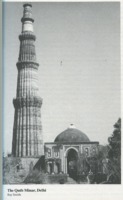 “On the next day we arrived at the city of Dihli [Delhi], the metropolis of India, a vast and magnificent city, uniting beauty with strength. It is surrounded by a wall that has no equal in the world, and is the largest city in India, nay rather the largest city in the entire Muslim Orient. The city of Delhi is made up now of four neighbouring and contiguous towns. One of them is Delhi proper, the old city built by the infidels and captured in the year 1188. The second is called Siri, known also as the Abode of the Caliphate; this was the town given by the sultan to Ghiyath ad-Din, the grandson of the ‘Abbasid Caliph Mustansir, when he came to his court. The third is called Tughlaq Abad, after its founder, the Sultan Tughlaq, the father of the sultan of India to whose court we came...The fourth is called Jahan Panah, and is set apart for the residence of the reigning sultan, Muhammad Shah. He was the founder of it and it was his intention to unite these four towns within a single wall, but after building part of it he gave up the rest because of the expense required for its construction. The cathedral mosque occupies a large area; its walls, roof, and paving are all constructed of white stones, admirably squared and firmly cemented with lead. There is no wood in it at all...In the northern court is the minaret, which has no parallel in the lands of Islam.”
“On the next day we arrived at the city of Dihli [Delhi], the metropolis of India, a vast and magnificent city, uniting beauty with strength. It is surrounded by a wall that has no equal in the world, and is the largest city in India, nay rather the largest city in the entire Muslim Orient. The city of Delhi is made up now of four neighbouring and contiguous towns. One of them is Delhi proper, the old city built by the infidels and captured in the year 1188. The second is called Siri, known also as the Abode of the Caliphate; this was the town given by the sultan to Ghiyath ad-Din, the grandson of the ‘Abbasid Caliph Mustansir, when he came to his court. The third is called Tughlaq Abad, after its founder, the Sultan Tughlaq, the father of the sultan of India to whose court we came...The fourth is called Jahan Panah, and is set apart for the residence of the reigning sultan, Muhammad Shah. He was the founder of it and it was his intention to unite these four towns within a single wall, but after building part of it he gave up the rest because of the expense required for its construction. The cathedral mosque occupies a large area; its walls, roof, and paving are all constructed of white stones, admirably squared and firmly cemented with lead. There is no wood in it at all...In the northern court is the minaret, which has no parallel in the lands of Islam.” -
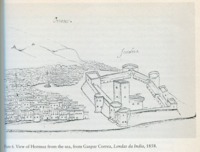 “I travelled next to the country of Hormuz. Hormuz is a town on the coast, called also Mughistan, and in the sea facing it and nine miles from shore is New Hormuz, which is an island. The town on it is called Jarawn. It is a large and fine city, with busy markets, as it is the port from which the wares from India and Sind are despatched to the ‘Iraqs, Fars and Khurasan. The island is saline, and the inhabitants live on fish and dates exported to them from Basra.”
“I travelled next to the country of Hormuz. Hormuz is a town on the coast, called also Mughistan, and in the sea facing it and nine miles from shore is New Hormuz, which is an island. The town on it is called Jarawn. It is a large and fine city, with busy markets, as it is the port from which the wares from India and Sind are despatched to the ‘Iraqs, Fars and Khurasan. The island is saline, and the inhabitants live on fish and dates exported to them from Basra.” -
“From Kulwa we sailed to Dhafari [Dhofar], at the extremity of Yemen. Thoroughbred horses are exported from here to India, the passage taking a month with a favouring wind. Dhafari is a month’s journey from ‘Aden across the desert, and is situated in a desolate locality without villages or dependencies. Its market is one of the dirtiest in the world and the most pestered by flies because of the quantity of fruit and fish sold there. Most of the fish are of the kind called sardines, which are extremely fat in that country. A curious fact is that these sardines are the sole food of their beasts and flocks, a thing which I have seen nowhere else. Most of the sellers [in the market] are female slaves, who wear black garments. The inhabitants cultivate millet and irrigate it from very deep wells, the water from which is raised in a large bucket drawn up by a number of ropes attached to the waists of slaves. Their principal food is rice, imported from India. Its population consists of merchants who live entirely on trade. When a vessel arrives they take the master, captain and writer in procession to the sultan’s palace and entertain the entire ship’s company for three days in order to gain the goodwill of the shipmasters. Another curious thing is that its people closely resemble the people of Northwest Africa in their customs. In the neighbourhood of the town there are orchards with many banana trees… The coco-palm is one of the strangest of trees, and looks exactly like a date-palm...One of its peculiarities is that oil, milk and honey are extracted from it. The honey is made in this fashion. They cut a stalk on which the fruit grows, leaving two fingers’ length, and one this they tie a small bowl, into which the sap drips. If this has been done in the morning, a servant climbs up again in the evening with two bowls, one filled with water. He pours into the other the sap that has collected, then washes the stalk, cuts off a small piece, and ties on another bowl. The same thing is repeated next morning until a good deal of sap has been collected, when it is cooked until it thickens. It then makes an excellent honey, and the merchants of India, Yemen, and China buy it and take it to their own countries, where they manufacture sweetmeats from it.”
-
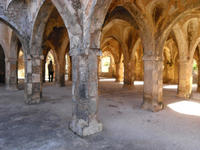 “We stayed one night in this island, and then pursued our journey to Kulwa, which is a large town on the coast. The majority of its inhabitants are Zanj, jet-black in colour, and with tattoo marks on their faces. I was told by a merchant that the town of Sufala lies a fortnight’s journey [south] from Kulwa, and that gold dust is brought to Sufala from Yufi in the country of the Limis, which is a month’s journey distant from it. Kulwa is a very fine and substantially built town, and its buildings are of wood...The sultan at the time of my visit was Abu’l-Muzaffar Hasan, who was noted for his gifts and generosity. He used to devote the fifth part of the booty made on his expeditions to pious and charitable purposes, as is prescribed in the Koran, and I have seen him give the clothes off his back to a mendicant who asked for them.”
“We stayed one night in this island, and then pursued our journey to Kulwa, which is a large town on the coast. The majority of its inhabitants are Zanj, jet-black in colour, and with tattoo marks on their faces. I was told by a merchant that the town of Sufala lies a fortnight’s journey [south] from Kulwa, and that gold dust is brought to Sufala from Yufi in the country of the Limis, which is a month’s journey distant from it. Kulwa is a very fine and substantially built town, and its buildings are of wood...The sultan at the time of my visit was Abu’l-Muzaffar Hasan, who was noted for his gifts and generosity. He used to devote the fifth part of the booty made on his expeditions to pious and charitable purposes, as is prescribed in the Koran, and I have seen him give the clothes off his back to a mendicant who asked for them.” -
“I embarked at Maqdashaw for the Sawahil country, with the object of visiting the town of Kulwa [Kilwa, Quiloa] in the land of the Zanj. We came to Mambasa [Mombasa], a large island two days’ journey by sea from the Sawahil country. It possesses no territory on the mainland. They have fruit trees on the island, but no cereals, which have to be brought to them from the Sawahil. Their food consists chiefly of bananas and fish. The inhabitants are pious, honourable, and upright, and they have well-built wooden mosques.”
-
“...we sailed for fifteen days and came to Maqdashaw [Mogadishu], which is an enormous town. Its inhabitants are merchants and have many camels, of which they slaughter hundreds every day [for food]. When a vessel reaches the port, it is met by sumbuqs, which are small boats, in each of which are a number of young men, each carrying a covered dish containing food. He presents this to one of the merchants on the ship saying ‘This is my guest,’ and all the others do the same. Each merchant on disembarking goes only to the house of the young man who is his host, except those who have made frequent journeys to the town and know its people well; these live where they please. The host then sells his goods for him and buys for him, and if anyone buys anything from him at too low a price or sells to him in the absence of his host, the sale is regarded by them as invalid. This practice is of great advantage to them. When these young men came on board our vessel, one of them approached me. My companions said ‘This man is not a merchant, but a theologian,’ whereupon the young man called out to his friends ‘This is the qadi’s guest.’ Amongst them was one of the qadi’s men, who went to tell him of this, so he came down to the beach with a number of students, and sent one of them to me. When I disembarked with my party, I saluted him and his party, and he said ‘In the name of God, let us go and salute the Shaykh.’ Thereupon I said ‘And who is this Shaykh?’ He answered ‘The sultan,’ for they call the sultan ‘the Shaykh.’ I said to him ‘When I have settled down I shall go to him,’ and he replied ‘It is the custom that whenever a theologian, or sharif, or man of religion comes here, he must see the sultan before taking his lodging.’ So I went to him as they asked. The sultan, whose name is Abu Bakr, is of Berberah origin, and he talks in the Maqdishi language, though he knows Arabic. When we reached the palace and news of my arrival was sent in, a eunuch came out with a plate containing betel leaves and areca nuts. He gave me ten leaves and a few nuts, the same to the qadi, and the rest to my companions and the qadi’s students, and then said ‘Our master commands that he be lodged in the students’ house.’ Later on the same eunuch brought food from the ‘Shaykh’s’ palace. With him came one of the wazirs, whose duty it was to look after the guests, and who said ‘Our master greets you and bids you welcome.’ We stayed there three days, food being brought to us three times a day, and on the fourth, a Friday, the qadi and one of the wazirs brought me a set of garments. We then went to the mosque and prayed behind the [sultan’s] screen. When the ‘Shaykh’ came out I greeted him and he bade me welcome. He put on his sandals, ordering the qadi and myself to do the same, and set out for his palace on foot. All the other people walked barefooted. Over his head were carried four canopies of coloured silk, each surmounted by a golden bird. After the palace ceremonies were over, all those present saluted and retired.”
-
“I travelled thence to 'Aden, the port of Yemen, on the coast of the ocean. It is surrounded by mountains and can be approached from one side only; it has no crops, trees, or water, but has reservoirs in which rainwater is collected. The Arabs often cut off the inhabitants from their supply of drinking-water until the they buy them off with money and pieces of cloth. It is an exceedingly hot place. It is the port of the Indians, and to it come large vessels from Kinbayat [Cambay], Kawlam [Quilon], Calicut and many other Malabar ports [on the south-west coast of India]. There are Indian merchants living there, as well as Egyptian merchants. Its inhabitants are all either merchants, porters, or fishermen. Some of the merchants are immensely rich, so rich that sometimes a single merchant is sole owner of a large ship with all it contains, and this is a subject of ostentation and rivalry amongst them. In spite of that they are pious, humble, upright, and generous in character, treat strangers well, give liberally to devotees, and pay in full the tithes due to God.”
-
“We went from there to the town of Ta‘izz, the capital of the king of Yemen, and one of the finest and largest towns in that country. Its people are overbearing, insolent, and rude, as is generally the case in towns where kings reside. Ta‘izz is made up of three quarters; the first is the residence of the king and his court, the second, called ‘Udayna, is the military station, and the third, called al-Mahalib, is inhabited by the commonality, and contains the principal market. The sultan of Yemen is Nur ad-Din ‘Ali of the house of Rasul. He uses an elaborate ceremonial in his audiences and progresses. The fourth day after our arrival was a Thursday, on which day the king holds a public audience. The qadi presented me to him and I saluted him...The wazir was present, and the king ordered him to treat me honorably and arrange for my lodging.”
-
“Zabid is a hundred and twenty miles from San‘a, and is after San‘a the largest and wealthiest town in Yemen. It lies amidst luxuriant gardens with many streams and fruits, such as bananas and the like. It is in the interior, not on the coast, and is one of the capital cities of the country. The town is large and populous, with palm-groves, orchards, and running streams--in fact, the pleasantest and most beautiful town in Yemen. Its inhabitants are charming in their manners, upright, and handsome, and the women especially are exceedingly beautiful. The people of this town hold the famous [junketings called] subut an-nakhl in this wise. They go out to the palm-groves every Saturday during the season of the colouring and ripening of the dates. Not a soul remains in the town, whether of the townsfolk or of the visitors. The musicians go out [to entertain them], and the shopkeepers go out selling fruits and sweetmeats. The women go in litters on camels. For all we have possessed of excellent qualities. They show a predilection for foreigners, and do not refuse to marry them, as the women in our country do.”
-
“After two days’ travelling we reached the island of Sawakin [Suakin]. It is a large island lying about six miles off the coast, and has neither water nor cereal crops nor trees. Water is brought to it in boats, and it has large reservoirs for collecting rainwater. The flesh of ostriches, gazelles and wild asses is to be had in it, and it has many goats together with milk and butter, which is exported to Mecca. Their cereal is jurjur, a kind of coarse grained millet, which is also exported to Mecca. The sultan of Sawakin when I was there was the Sharif Zayd, the son of the amir of Mecca.”
-
“Six days after leaving Sawakin we reached the town of Hali, a large and populous town inhabited by two Arab tribes. The sultan is a man of excellent character, a man of letters and a poet. I had accompanied him from Mecca to Judda, and when I reached his city he treated me generously and made me his guest for several days. I embarked in a ship of his and reached the township of Sarja, which is inhabited by Yemenite merchants. They are generous and open-handed, supply food to travellers and assist pilgrims, transporting them in their ships and providing for them from their own funds. We stayed at Sarja only one night as their guests, then sailed on to the roadstead of al-Ahwab and thence went up to Zabid.”
-
“After the Pilgrimage at the close of the year 1330 I set out from Mecca, making for yemen. I arrived at Judda [Jedda], an ancient town on the sea-coast, which is said to have been built by the Persians...At the Friday service at Judda, the muezzin comes and counts the number of the inhabitants of the town present. If they amount to forty the preacher holds the Friday service, but if they are fewer he prays the midday prayer four times, taking no account of the strangers present, however many they may be.”
-
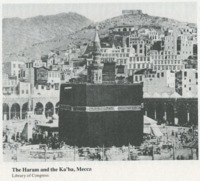 “We set out at night from this blessed valley, with hearts full of joy at reaching the goal of our hopes, and in the morning arrived at the City of Surety, Mecca (may God ennoble her!), where we immediately entered the holy sanctuary and began the rites of pilgrimage. The inhabitants of Mecca are distinguished by many excellent and noble activities and qualities, by their beneficence to the humble and weak, and by their kindness to strangers. When any of them makes a feast, he begins by giving food to the religious devotees who are poor and without resources, inviting them first with kindness and delicacy. The majority of these unfortunates are to be found by the public bakehouses, and when anyone has his bread baked and takes it away to his house, they follow him and he gives each one of them some share of it, sending away none disappointed. Even if he has but a single loaf, he gives away a third or a half of it, cheerfully and without any grudgingness. Another good habit of theirs is this. The orphan children sit in the bazaar, each with two baskets, one large and one small. When one of the townspeople comes to the bazaar and buys cereals, meat and vegetables, he hands them to one of these boys, who puts the cereals in one basket and the meat and vegetables in the other and takes them to the man's house, so that his meal may be prepared. Meanwhile the man goes about his devotions and his business. There is no instance of any of the boys having ever abused their trust in this matter, and they are given a fixed fee of a few coppers. The Meccans are very elegant and clean in their dress, and most of them wear white garments, which you always see fresh and snowy. They use a great deal of perfume and kohl and make free use of toothpicks of green arak-wood. The Meccan women are extraordinarily beautiful and very pious and modest. They too make great use of perfumes to such a degree that they will spend the night hungry in order to buy perfumes with the price of their food. They visit the mosque every Thursday night, wearing their finest apparel; and the whole sanctuary is saturated with the smell of their perfume. When one of these women goes away the odour of the perfume clings to the place after she has gone.”
“We set out at night from this blessed valley, with hearts full of joy at reaching the goal of our hopes, and in the morning arrived at the City of Surety, Mecca (may God ennoble her!), where we immediately entered the holy sanctuary and began the rites of pilgrimage. The inhabitants of Mecca are distinguished by many excellent and noble activities and qualities, by their beneficence to the humble and weak, and by their kindness to strangers. When any of them makes a feast, he begins by giving food to the religious devotees who are poor and without resources, inviting them first with kindness and delicacy. The majority of these unfortunates are to be found by the public bakehouses, and when anyone has his bread baked and takes it away to his house, they follow him and he gives each one of them some share of it, sending away none disappointed. Even if he has but a single loaf, he gives away a third or a half of it, cheerfully and without any grudgingness. Another good habit of theirs is this. The orphan children sit in the bazaar, each with two baskets, one large and one small. When one of the townspeople comes to the bazaar and buys cereals, meat and vegetables, he hands them to one of these boys, who puts the cereals in one basket and the meat and vegetables in the other and takes them to the man's house, so that his meal may be prepared. Meanwhile the man goes about his devotions and his business. There is no instance of any of the boys having ever abused their trust in this matter, and they are given a fixed fee of a few coppers. The Meccans are very elegant and clean in their dress, and most of them wear white garments, which you always see fresh and snowy. They use a great deal of perfume and kohl and make free use of toothpicks of green arak-wood. The Meccan women are extraordinarily beautiful and very pious and modest. They too make great use of perfumes to such a degree that they will spend the night hungry in order to buy perfumes with the price of their food. They visit the mosque every Thursday night, wearing their finest apparel; and the whole sanctuary is saturated with the smell of their perfume. When one of these women goes away the odour of the perfume clings to the place after she has gone.” -
“On the third day after leaving al-Ula the caravan halts in the outskirts of the holy city of Madina. That same evening we entered the holy sanctuary and reached the illustrious mosque, halting in salutation at the Gate of Peace; then we prayed in the illustrious ‘garden’ between the tomb of the Prophet and the noble pulpit, and reverently touched the fragment that remains of the palm-trunk against which the Prophet stood when he preached. Having paid our meed of salutation to the lord of men from first to last, the intercessor for sinners, the Prophet of Mecca, Muhammad, as well as to his two companions who share his grave, Abu Bakr and 'Omar, we returned to our camp, rejoicing at this great favour bestowed upon us, praising God for our having reached the former abodes and the magnificent sanctuaries of His holy Prophet, and praying Him to grant that this visit should not be our last and that we might be of those whose pilgrimage is accepted. On this journey, our stay at Medina lasted four days. We used to spend every night in the illustrious mosque, where the people, after forming circles in the courtyard and, lighting large numbers of candles, would pass the time either in reciting the Koran from volumes set on rests in front of them, or in intoning litanies, or in visiting the sanctuaries of the holy tomb.”
-
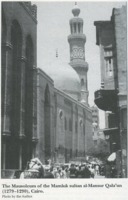 “I arrived at length at Cairo, mother of cities and seat of Pharaoh the tyrant, mistress of broad regions and fruitful lands, boundless in multitude of buildings, peerless in beauty and splendour, the meeting-place of comer and goer, the halting-place of feeble and mighty, whose throngs surge as the waves of the sea, and can scarce be contained in her for all her size and capacity… The mosque of ‘Amr is highly venerated and widely celebrated. The Friday service is held in it, and the road runs through it from east to west. The madrasas [college mosques] of Cairo cannot be counted for multitude. As for the Maristan [hospital], which lies ‘between the two castles’ near the mausoleum of Sultan Qala‘un, no description is adequate to its beauties.”
“I arrived at length at Cairo, mother of cities and seat of Pharaoh the tyrant, mistress of broad regions and fruitful lands, boundless in multitude of buildings, peerless in beauty and splendour, the meeting-place of comer and goer, the halting-place of feeble and mighty, whose throngs surge as the waves of the sea, and can scarce be contained in her for all her size and capacity… The mosque of ‘Amr is highly venerated and widely celebrated. The Friday service is held in it, and the road runs through it from east to west. The madrasas [college mosques] of Cairo cannot be counted for multitude. As for the Maristan [hospital], which lies ‘between the two castles’ near the mausoleum of Sultan Qala‘un, no description is adequate to its beauties.” -
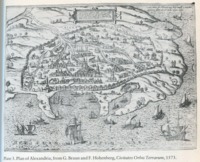 “At length on April 5th (1326) we reached Alexandria. It is a beautiful city, well-built and fortified with four gates and a magnificent port. Among all the ports in the world I have seen none to equal it except Kawlam [Quilon] and Calicut in India, the port of the infidels [Genoese] at Sudaq in the land of the Turks, and the port of Zaytun in China… One of the learned men of Alexandria was the qadi, a master of eloquence, who used to wear a turban of extraordinary size...Another of them was the pious ascetic Burhan ad-Din, whom I met during my stay and whose hospitality I enjoyed for three days. One day as I entered his room he said to me ‘I see that you are fond of travelling through foreign lands.’ I replied ‘Yes, I am’ (though I had as yet no thought of going to such distant lands as India or China). Then he said ‘You must certainly visit my brother Farid ad-Din in India, and my brother Rukn ad-Din in Sind, and my brother Burhan ad-Din in China, and when you find them give them greeting from me.’ ” Transition in trade routes from Persian Gulf to Red Sea due to fall of Baghdad to Mongols. By this time Alexandria was an important connection as a Red Sea port to the Mediterranean as well as to Southern Arabia.
“At length on April 5th (1326) we reached Alexandria. It is a beautiful city, well-built and fortified with four gates and a magnificent port. Among all the ports in the world I have seen none to equal it except Kawlam [Quilon] and Calicut in India, the port of the infidels [Genoese] at Sudaq in the land of the Turks, and the port of Zaytun in China… One of the learned men of Alexandria was the qadi, a master of eloquence, who used to wear a turban of extraordinary size...Another of them was the pious ascetic Burhan ad-Din, whom I met during my stay and whose hospitality I enjoyed for three days. One day as I entered his room he said to me ‘I see that you are fond of travelling through foreign lands.’ I replied ‘Yes, I am’ (though I had as yet no thought of going to such distant lands as India or China). Then he said ‘You must certainly visit my brother Farid ad-Din in India, and my brother Rukn ad-Din in Sind, and my brother Burhan ad-Din in China, and when you find them give them greeting from me.’ ” Transition in trade routes from Persian Gulf to Red Sea due to fall of Baghdad to Mongols. By this time Alexandria was an important connection as a Red Sea port to the Mediterranean as well as to Southern Arabia. -
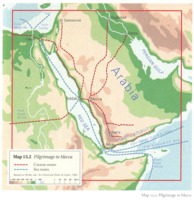 “I left Tangier, my birthplace, on Thursday, 2nd Rajab, 725 [14th June, 1325], being at that time twenty-two [lunar] years of age, with the intention of making the Pilgrimage to the Holy House [at Mecca] and the Tomb of the Prophet [at Medina]. I set out alone, finding no companion to cheer the way with friendly intercourse, and no party of travellers with whom to associate myself. Swayed by an overmastering impulse within me, and a long-cherished desire to visit those glorious sanctuaries, I resolved to quit all my friends and tear myself away from my home. As my parents were still alive, it weighed grievously upon me to part from them, and both they and I were afflicted with sorrow.” Cosmopolitanism of the Hajj, religious and commercial center.
“I left Tangier, my birthplace, on Thursday, 2nd Rajab, 725 [14th June, 1325], being at that time twenty-two [lunar] years of age, with the intention of making the Pilgrimage to the Holy House [at Mecca] and the Tomb of the Prophet [at Medina]. I set out alone, finding no companion to cheer the way with friendly intercourse, and no party of travellers with whom to associate myself. Swayed by an overmastering impulse within me, and a long-cherished desire to visit those glorious sanctuaries, I resolved to quit all my friends and tear myself away from my home. As my parents were still alive, it weighed grievously upon me to part from them, and both they and I were afflicted with sorrow.” Cosmopolitanism of the Hajj, religious and commercial center.
